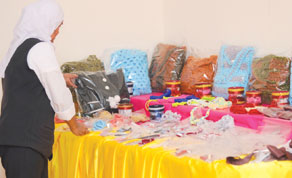 |
| An inmate arranging items made by women at the Qatari House for Lodging and Human Care |
Qatar Foundation for Combating Human Trafficking (QFCHT) co-operates with local and international organisations in its efforts to protect workers’ rights, an official of the organisation said.
Ameena Y al-Jaidah, head of public relations and communications, said QFCHT works in co-ordination with the Ministry of Interior, civil society organisations and embassies. It has close co-operation with the United Nations Office on Drugs and Crime, International Organisation for Migration, Unesco, the International Red Cross and other organisations.
QFCHT also conducts awareness campaigns for labourers and domestic workers in co-operation with Fanar. This includes the distribution of brochures in different languages to instruct labourers on their rights and how to benefit from its services.
Al-Jaidah said QFCHT is a non-profit private organisation that works to eliminate all types of exploitation, especially of women and children. The Qatari House for Lodging and Human Care was established for this purpose.
 |
| Ameena Y al-Jaidah |
Al-Tamimi said women are offered culture and entertainment activities as well as being taught skills such as cooking, dressmaking and embroidery. Their products are displayed in fairs at Katara and other public facilities. The income is usually used to support the services of the House.
The inmates are also given monthly allowances and support till their cases are resolved. Inmates can stay for up to six months or a year in some cases. The House takes in victims who are at risk and have no other shelter. Those in less vulnerable situations and who have a place to stay are offered support.
Al-Jaidah said cases are usually referred to the organisation through the ministries of Interior, Labour, and Health. Non-governmental organisations, civil society organisations and companies and individuals can also refer cases. Victims can also approach QFCHT directly.
As for male victims, Al-Jaidah said the House has a plan to include them. Currently, they are offered material, psychiatric and legal support.
She said QFCHT offers free legal services to victims until they attain their rights, also ensuring that they are safe throughout the process and no repatriation takes place until their cases are resolved. Some victims even wish to stay on and are granted a transfer, and QFCHT offers them further support.
QFCHT can be reached on its hotline: 55653388.

